Salt in our history’s wounds
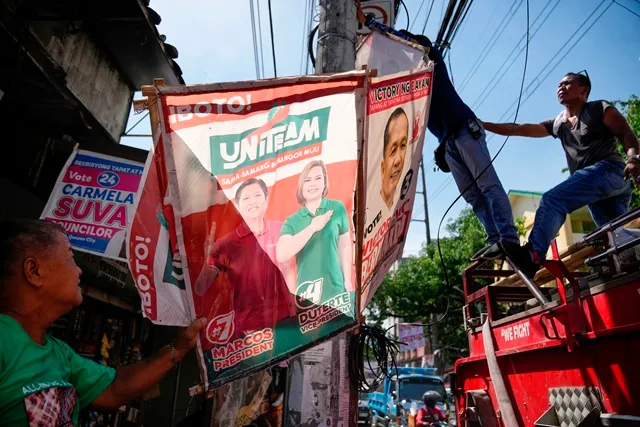
Source:AP
Ferdinand “Bongbong” Marcos, son of the late dictator Ferdinand Marcos, won the latest presidential election in the Philippines. A veteran Filipino reporter shared his thoughts on what it means and its lessons for Taiwan.
Views
Salt in our history’s wounds
By Michael Beltranweb only
Ferdinand “Bongbong” Marcos Jr, son of the late dictator Ferdinand Marcos is set to assume the presidency after winning a landslide victory with 31 million votes in the recently concluded elections. His running mate, Sara Duterte, daughter of sitting President Rodrigo Duterte will step into the executive alongside him.
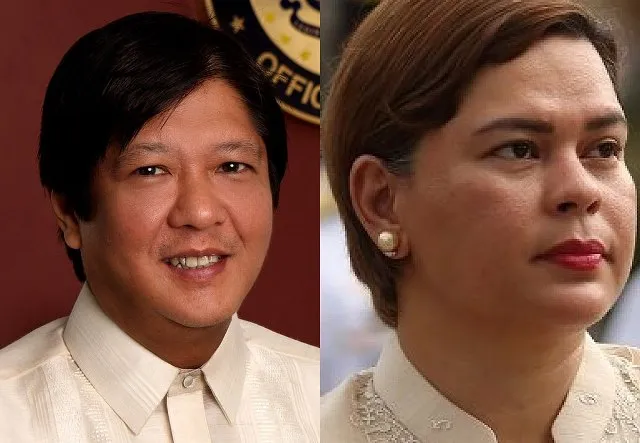 Ferdinand Romualdez Marcos Jr.( left), Sara Duterte (right) (Source: Wikipedia)
Ferdinand Romualdez Marcos Jr.( left), Sara Duterte (right) (Source: Wikipedia)
The Duterte family in the last six years has terrorized the country with relentless state violence and economic mismanagement. If Marcos senior is best known for imposing Martial Law, then Duterte’s tenure is the closest thing the country has had to since then. The Marcos-Duterte tandem formed what is one of the most terrifying coalitions of authoritarian political power in the country’s history.
The Philippine election signals another victory for authoritarians and conservatives in the Asia-Pacific region. It also ushers in the continuation of another regime who is willing to succumb to Chinese interventionism in the region. But more worryingly, it is a display of the awesome and awful power that disinformation can have on a people. Taiwan, through its people and assertions of independence and democracy has to some extent had some extent in resisting both these trends. But with a Marcos on the seat of power, that collective grip on civil liberties and truthfulness in the region just got a whole lot looser.
One might say this was an election won by fake news and glitches.
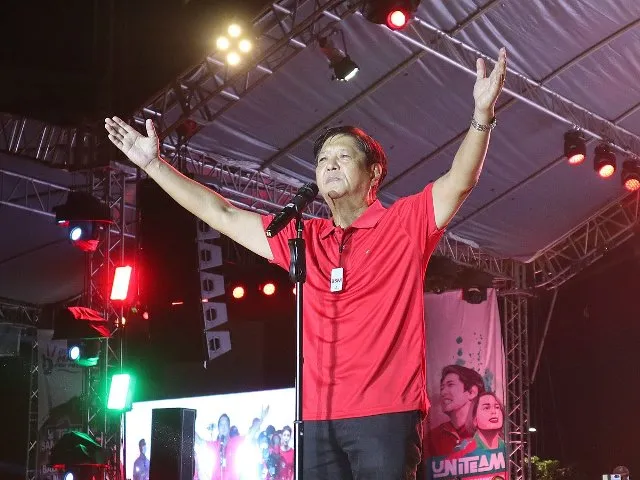 Ferdinand Romualdez Marcos Jr. (Source: Wikipedia)
Ferdinand Romualdez Marcos Jr. (Source: Wikipedia)
Over a decade ago, it was normal to speak of Martial Law and the Marcoses in a bad light. The late dictator had thousands murdered and tortured. The family plundered more than $10 billion. But as the years went on, what was once considered fact was suddenly up for debate.
The Philippines is one of the most social media savvy countries in the world. One study revealed that it ranked second among populations that spend the most time on various internet platforms. Duterte’s bid for the Presidency saw him employ millions of pesos worth of click farms and troll accounts constantly creating content. It worked. It’s hard to tell who gave lessons to whom, but the Marcos family has certainly employed the same tactics. In 2020, it was revealed that the infamous Cambridge Analytica, involved in the Facebook data leak, struck a deal with the Marcoses to “rebrand their image.” This information became known just because the data firm had a whistle-blower. But with seemingly unlimited stolen wealth behind them, the Marcos family has been planting the seeds of this victory with disinformation for the past decade.
Through the years, fake news claims have grown to be widespread alternative versions of history. “The Marcos family built the Eiffel Tower, what an amazing achievement,” “Corazon Aquino (Marcos’ main rival) was just a puppet of Spanish colonizers” are just some of the ridiculous claims you can find online with detailed and fabricated histories. Among the most popular is that Marcos senior through his supposed brilliant skills as a lawyer, became rich through inherited wealth from the mysterious kings and queens of a lost kingdom (Tallano clan) and is the rightful heir to rule the archipelago! Through the years, fake news claims have grown to be widespread alternative versions of history.
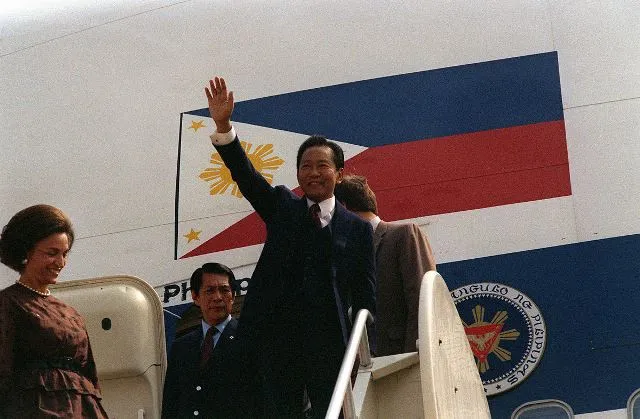 Ferdinand Marcos (Source: Wikipedia)
Ferdinand Marcos (Source: Wikipedia)
But the central goal of the disinformation campaign was to back up the assertions of Marcos Jr throughout his campaign that the Martial Law years were a “golden era” cut short by political intrigue. Even if the truth is, it was one of the most economically depressing periods ended by a people’s uprising. The Philippines is still paying the debt incurred by the Marcos family with huge chunks of the national budget until 2025.
It didn’t help that since 2014, Philippine history as a subject has been eradicated by education officials in a bid to adhere to globalization and labor export demands. Plus, less than a quarter of the population complete schooling.
Combine one of the biggest and most sustained disinformation campaigns with an internet-crazy population deprived of an education on their history and you get a Marcos restoration.
What the victims of Martial Law must be feeling, I can only shudder to imagine the type of revived pain it conjures. In the 70s, my mother was detained and interrogated with the sight of her then husband beaten, tortured then eventually murdered. Ask any Martial Law victim, the scars from their ordeals are forever branded in their psyche, like a phantom pain of hot iron they can never escape.
In my work as a journalist, the most harrowing stories I’d heard are from Martial Law survivors. I’ve been told of barbed wires inserted into penises, broken bottles and bayonets into vaginas, men left on beds of ice then electrocuted, people shackled in solitary confinement for a decade, an assortment of nightmarish tales the Marcos family would like the country to forget, or worse, believe to be some form of benevolent disciplinary action, a kind of political and historical gaslighting.
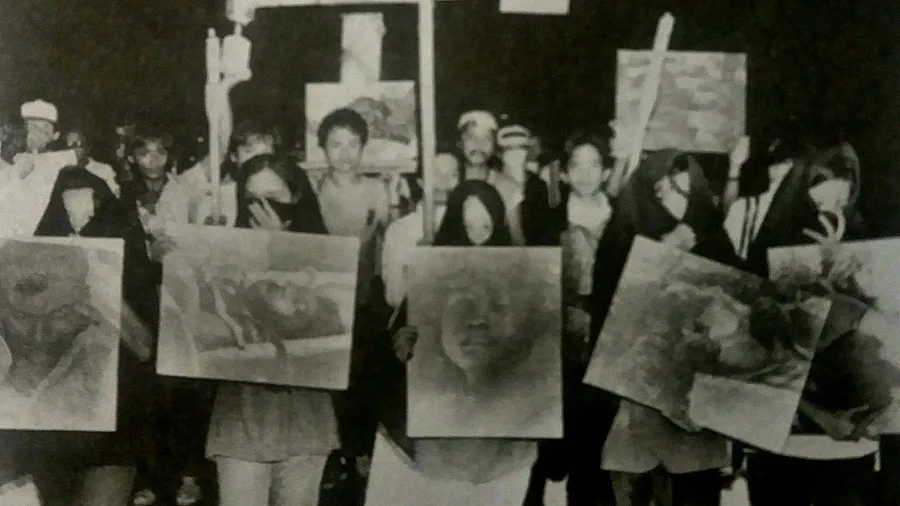 The protest Against the Marcos Dictatorship in 1986. (Source: Wikipedia)
The protest Against the Marcos Dictatorship in 1986. (Source: Wikipedia)
The spread of malicious news to influence electoral results is in itself a violation of the country’s laws. However, much of the scrutiny should also be directed at the composition and actions of election officials. Senator Imee Marcos, Bongbong’s sister, is the legislative head of electoral reform. The COMELEC, despite overwhelming evidence and admission by the tax authorities that the Marcos family has billions in unpaid estate taxes, allowed Marcos Jr to run for office.
On Election Day, cops were videoed tearing up hundreds of ballots in secrecy. Most of all, the Vote Count Machines (VCM) meant to digitize and speed up voting malfunctioned in unprecedented numbers. More than 2,000 machines were unusable on Election Day, and only a few were replaced in time. Many voters waited in queues for as long as 24 hours in the unforgiving Philippine summer. Logistics was a definite area of suspicion, more so because they were handled by F2 Logistics, owned by Duterte business associate Dennis Uy.
The stage had been set for a while now, with key actors playing their parts perfectly, casting a shadow over the outcome. Some will argue that Marcos Jr was already staggeringly popular anyway, so they didn’t have to rig any aspect of the voting. He certainly was a frontrunner in the polls due to his fake news campaigns, but the election result also managed to edge out much of the remaining opposition in the senate and congress. By the COMELEC’s own admission a day later they had been “well prepared” for what they felt was a “peaceful” conclusion.
The day after elections was marked by protests, angry, ear-splitting screams against fraud and a return to dictatorship. At the time of writing, they haven’t stopped. The momentum of the renewed movement against the Marcos restoration will ebb and flow, but never has a President been met with such ferocious backlash so soon.
The Philippines is unravelling at a most frightening and invigorating pace for those who seek to push back against the wrong side of history. This year is the 50th anniversary of the Martial Law declaration and we have another Marcos in power. What a cruel joke history plays on its survivors.
But if we remember, and we should try our best to remember correctly, Marcos was toppled. He didn’t leave of his own volition, he was yanked down from his seat of power by an uprising. The roots of revolt are still here, for Filipinos and the world alike to witness and take part in.
For all our foreign friends out there looking to visit and like to get colloquial with “Mabuhay” and “Kamusta,” many of us would still appreciate the warmth in unsettling times. And please add another phrase to your guidebooks, one that is certain to make a popular comeback from its origins in the Martial Law period. Join us by greeting “tuloy ang laban” (carry on the fight).
(This piece reflects the author's opinion, and does not represent the opinion of CommonWealth Magazine.)
About the Author
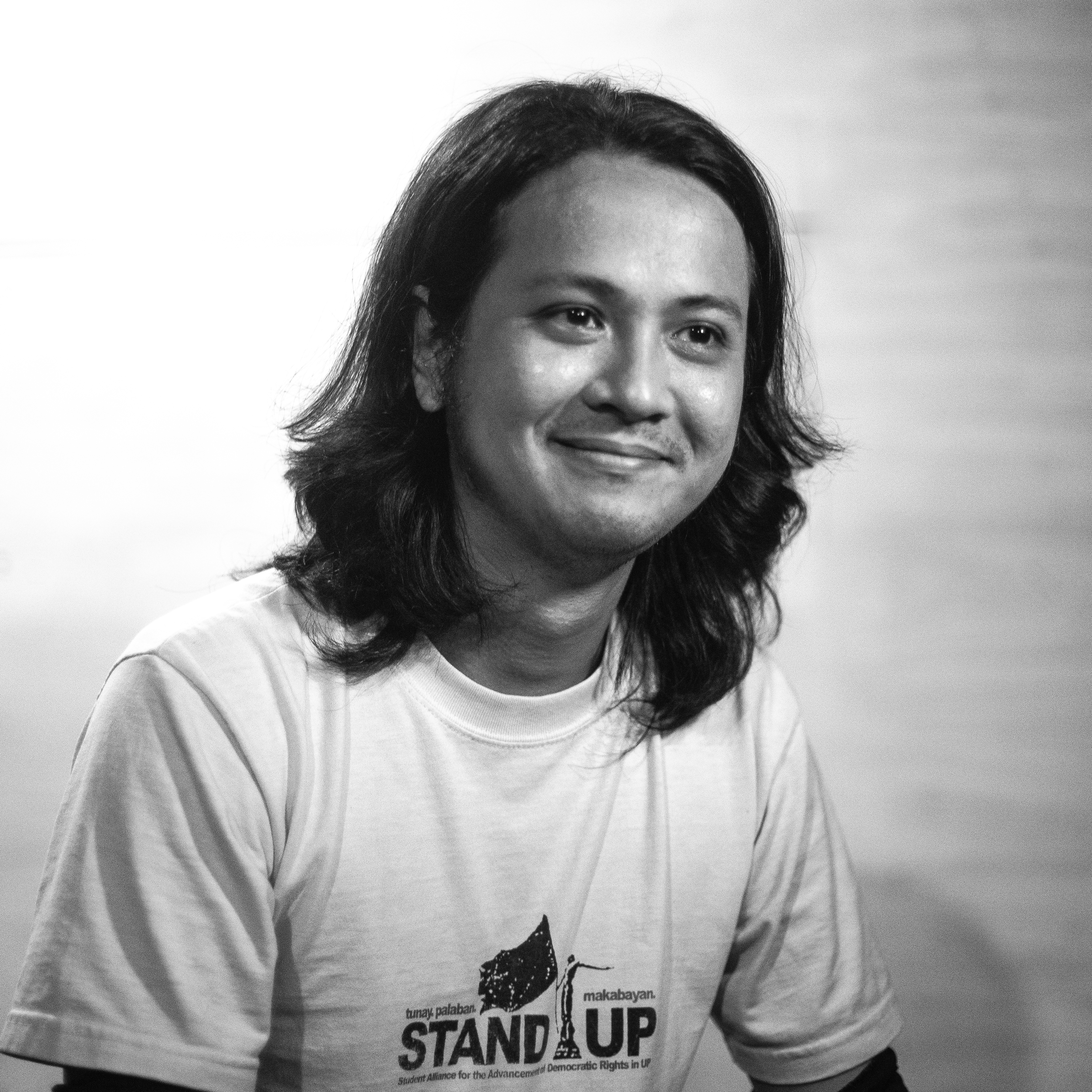
Michael Beltran is a journalist from the Philippines.
Have you read
- EU dealing with conflict in Europe with rival China on the mind
- Taiwan and Poland are destined to be allies
- Taiwan stands out for the world to see
Uploaded by Ian Huang






